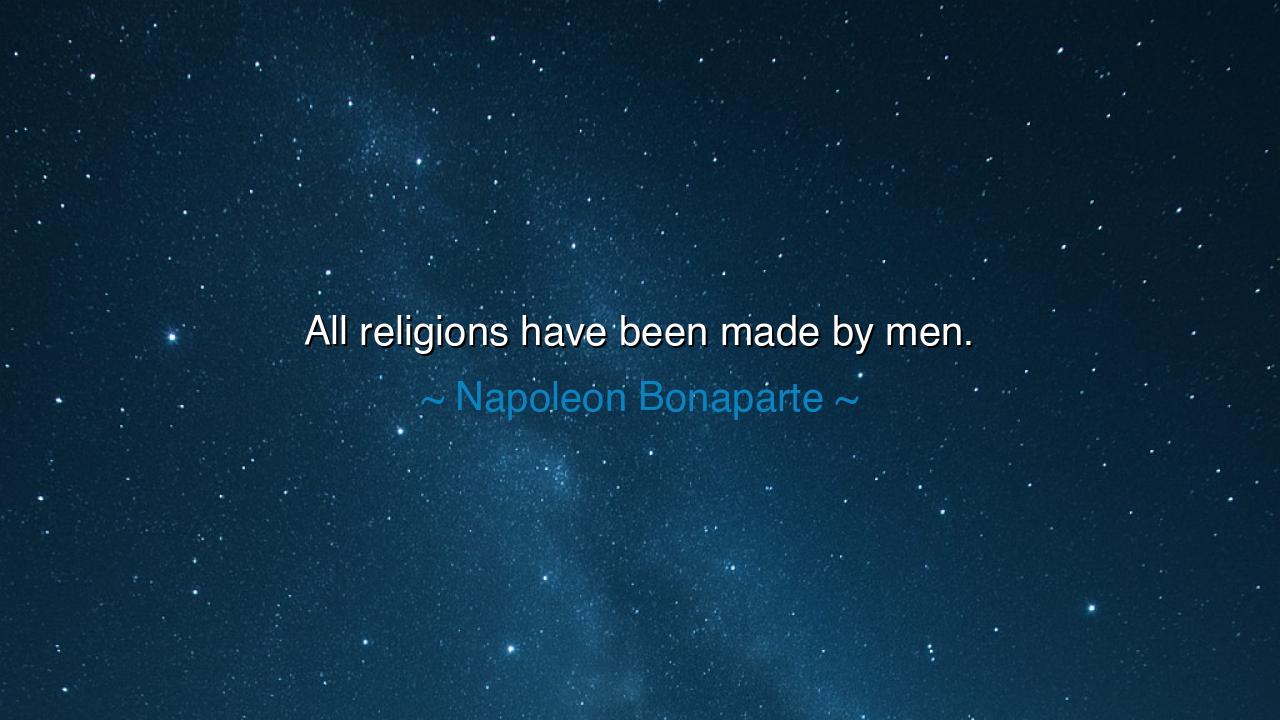
All religions have been made by men.






Napoleon Bonaparte, conqueror of kingdoms and shaper of destinies, once declared with a soldier’s clarity: “All religions have been made by men.” These words, sharp as the edge of a blade, pierce through centuries of reverence and ritual. They do not deny the mystery of the divine, but they remind us that the forms, the temples, the laws, the rites—all these are the works of human hands and human minds. The Infinite may inspire, but the garments in which it is clothed are woven by mortals.
The meaning of this saying is both unsettling and liberating. For if all religions are made by men, then they carry within them both wisdom and weakness. They can guide, but they can also bind. They can lift souls toward heaven, but they can also chain them to the thrones of kings. Napoleon, a man who had seen the power of belief marshal armies and stir nations, knew that faith is not only a matter of eternity, but also a weapon and a tool in the hands of men. Thus his words were not scorn, but recognition: religions are as much about human needs, fears, and hopes as they are about the divine.
History bears witness. Consider the empire of Constantine, who, in adopting Christianity, reshaped Rome itself. A once-persecuted faith became the backbone of an empire. Cathedrals rose where temples once stood, bishops sat in councils like senators, and the cross became the symbol not only of salvation, but of imperial might. Was the divine absent? No. But the form and force of that religion—its councils, its creeds, its laws—were made and hammered by men. This is the truth Napoleon would have us see: that the sacred flame may descend from above, but the hearth that holds it is built by human hands.
And yet, there is a nobility in this human labor. That men across ages have sought to carve meaning out of chaos, to fashion songs, stories, and temples that give structure to their yearning for eternity—this is no small thing. To say that religions are made by men is not only to reduce them, but also to exalt mankind’s ceaseless striving. It is to acknowledge that within the human heart dwells a hunger for the divine so great that it builds entire worlds of worship.
But there is also danger. For when men forget that religions are human-shaped, they may mistake the vessel for the source, the form for the essence. They may fight over words and symbols, spilling rivers of blood over what was meant to guide them toward peace. Napoleon himself saw this in his time: priests blessing wars, crowns placed upon emperors in the name of heaven, rival sects condemning each other while worshipping the same unseen mystery. Thus, his words stand as a warning—when religion is wielded without humility, it becomes the sword of division rather than the balm of unity.
O children of tomorrow, learn this lesson well: respect all faiths, but worship none blindly. Understand that every creed carries wisdom, but also the mark of the men who made it. Seek the divine, but do not mistake the map for the land, nor the statue for the truth it points to. When you see division, remember that at the heart of all faiths lies the same human longing—to touch the eternal, to give shape to what is beyond shape.
Therefore, live with reverence but also with discernment. Study the scriptures of many traditions, for each holds a shard of light. Honor the temples, but know that the true temple is the heart that loves and the mind that seeks truth. Build not walls of dogma, but bridges of understanding. For if all religions are made by men, then all men share the same yearning, the same struggle, the same flame of spirit that seeks the divine.
And let this be the teaching you carry: honor the divine, but never forget the human hand that shapes the vessel. In this remembrance lies both humility and freedom—the humility to know we are all seekers, and the freedom to look beyond the forms of men toward the boundless mystery that no creed can contain.






AAdministratorAdministrator
Welcome, honored guests. Please leave a comment, we will respond soon